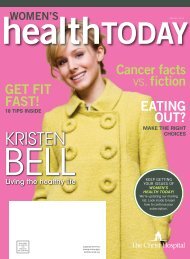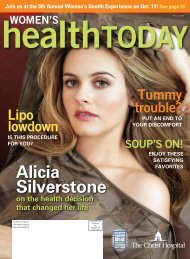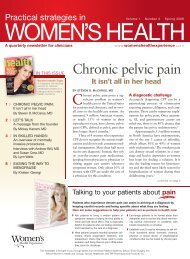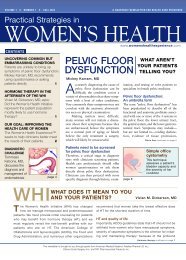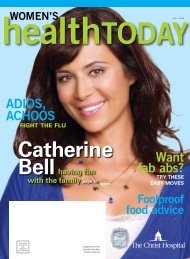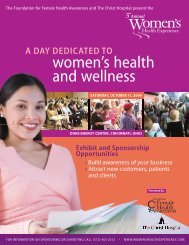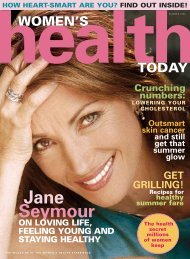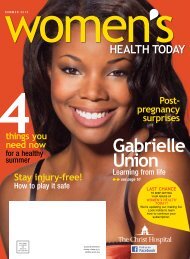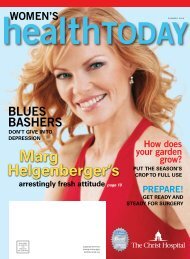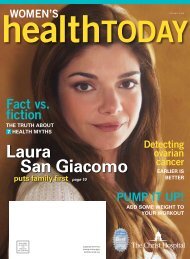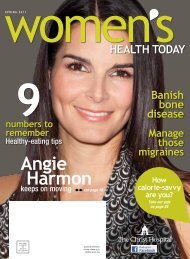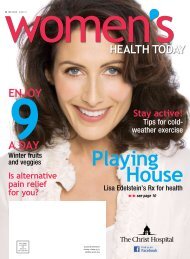Regina King - Women's Health Experience
Regina King - Women's Health Experience
Regina King - Women's Health Experience
- No tags were found...
You also want an ePaper? Increase the reach of your titles
YUMPU automatically turns print PDFs into web optimized ePapers that Google loves.
Boost yourenergy!Try these holistic pick-me-upsBy Becky McGilligan, MD>> You’re utterly exhausted and still have a fullto-do list to get through. Rather than reach foranother cup of coffee, try some holistic healing, whichfocuses on the whole person—not just the part of youthat’s not feeling well. Here are five whole-body waysto recharge your batteries and boost your energy:1Get moving. It’s the last thing you feel like doingwhen you’re wiped out, but physical activity canwake you up and improve your mood. Even a10- or 15-minute walk will help you power through therest of your day. Bonus: Exercise can also reduce stress,keep blood pressure and cholesterol in check and helpyou maintain a healthy weight.4Snack wisely.Avoid sugarysnacks—they’llmake you sleepy. Instead,opt for foods with agood balance ofcarbohydrates andprotein, which canhelp maintain bloodsugar levels and boostenergy throughout the day.Try low-fat yogurt topped with cereal,whole-wheat crackers with cheese or half apeanut butter sandwich on whole-wheat bread.2Eat breakfast. It’s tempting to skip your morningmeal, especially when you’re in a rush, buta healthy breakfast refuels your body and jumpstartsyour day. There’s even evidence that eating inthe a.m. can improve productivity and concentrationand help with weight control. Try a bowl of oatmeal,high-fiber, low-sugar cereal or a fruit smoothie.3Lighten up! Laughing quickens your pulse,stimulates blood circulation, increases oxygenintake and activates your muscles. Studies showlaughter also boosts levels of endorphins, your body’s“feel-good” hormones. So when you feel like you’reabout to crash, give a funny friend a call or check outan amusing video online.5Seek calm. It may be stress that’s sapping yourenergy. Ease your tension—and get energized—with alternative therapies such as aromatherapy,biofeedback, deep breathing exercises or massage. WHTTired all the time?We all have occasional periods of low energy orfatigue, but when every day is a struggle, give yourprimary care physician a call. He or she can help youdetermine if you have a more serious condition, suchas anemia, thyroid problems, insomnia or depression,or whether your medications are to blame (someallergy drugs, antidepressants and blood pressurepills can cause excessive sleepiness). If you need aprimary care physician, call 513.585.1000 or visitTheChristHospitalPhysicians.com to locate apractice or physician near you.>> Becky McGilligan, MD, is an internal medicine physician with The Christ Hospital Physicians.www.womenshealthexperience.com3
5 precautionsfor weekendwarriorsBy Marc Schneider, MD>> When weekdays are jam-packed with activityyou can’t reschedule, weekends may seem like theonly time you can squeeze in some exercise.Take heed, though. Not exercising all week, thengoing full tilt on the weekend, increases your chanceof injuries. To stay healthy and active, use thesestrategies recommended by the American Academyof Orthopaedic Surgeons.1Talk to your doctor about yourexercise and sports plans.Your primary care physician can discuss your healthrisks (like asthma, diabetes or an irregular heartbeat)with you and suggest precautions. If you have oldsports injuries, an orthopaedic surgeon can recommendinjury-beating modifications or stretches to conditionyour body for weekend play.2Always warm up and stretchbefore physical activity.Since cold muscles and stiff joints are more prone toinjury, you’ll be less likely to hurt yourself. Get yourheart pumping and warm up your muscles with jumpingjacks, jogging or an easy bike ride for five minutes.Next, perform gentle stretches for your entire body.3Wear supportive shoes and useappropriate equipment.Thinking a weekend run, aerobics class or otheractivity doesn’t justify spending money on new shoesor safety equipment can lead to injuries. Whetheryou walk, run or play tennis, your feet need support.For activities like inline skating, invest in appropriatepadding and a properly fitting helmet.4Increase your activitygradually.Pace yourself. Lengthen the time or distance youexercise by 10 percent a week and add new activitiesto your weekend conservatively.5Listen to your body.You’re probably not as fast or flexible as friendswho exercise regularly. Recognize fatigue and painsas signs you need to ease up or modify your fitnessprogram. Stop before you become exhausted.You’ll improve your health, control your weight betterand boost your mood more easily if you add anotherday or two of exercise during the week. But until youstart finding the time to squeeze in an exercise DVD ora power walk, start adding more activity into your days,like walking the dog longer, doing extra yard work andplaying with your children more often. WHTGet moving the right wayTo find a primary care or orthopaedic and sportsmedicine physician with The Christ Hospital,visit TheChristHospitalPhysicians.com orcall 513.585.1000.>> Marc Schneider, MD, is an orthopaedic surgeon and sports medicine specialistwith The Christ Hospital Physicians.4 women’s health today
Considering olderparenthood?Ask yourself these questions firstBy Melissa Heidi, MD>> Thinking about joining thegrowing numbers of women whoare postponing motherhooduntil 40 or older? A strongermarriage, a solid career and a biggerbank account are making ita popular option. Still, being anolder mom presents special challenges.Here are some issues tocontemplate:Are you ready for thechanges a baby willbring?The bottom line: Your life willnever be the same again! A new babywill require you and your partnerto make many adjustments professionally,personally and socially. Aninfant will add unpredictability toyour well-structured life. Will you beable to go with the flow?Do you have thestamina?Take a cold, hard look at yourhealth status. If you eat wholesomefoods, stay active and generallytreat yourself well, you’ll probablyhave the energy to weathersleepless nights and keep up withbaby’s demands. If not, now isthe time to tend to your totalwell-being.Do you have help?Younger moms often rely ontheir own mothers for parentingadvice and a helping hand—a luxuryolder mothers don’t always have.Try to create a support systembefore your child is born. Ask yourfriends and co-workers to introduceyou to new mothers. Be prepared tomake friends at childbirth preparationclasses.Do you have a sense ofhumor?You’ll need it the day somebodyasks how old your grandchild is!(It will happen even if you look likeMichelle Pfeiffer.)Are you willing to takemedical risks?The longer you wait to conceive,the harder it may be to getpregnant. If you do get pregnant,your fetus will be at higher risk forgenetic abnormalities, miscarriageand stillbirth. You yourself will beGet readyfor babyIt’s best for women of allages to get a clean bill ofhealth from their doctors beforegetting pregnant. To find anOb/Gyn with The Christ Hospital,visit TheChristHospital.com/women or call 513.585.1000.more likely to develop gestationaldiabetes, high blood pressure andpreeclampsia.What about yourpocketbook?Having a baby at 40 meansyou’ll be heading for retirement asyour child is heading off to college.Will your finances be able to withstandthe burden? WHT>> Melissa Heidi, MD, is an obstetrician/gynecologist with The Christ Hospital Physicians.www.womenshealthexperience.com5
<strong>Health</strong> Headlines>> what’s making news in women’s healthExercise linkedto conceptionTrying to conceive? You may be able to boost your babymakingodds with some moderate exercise, say researchers.While following 3,500 women ages 18 to 40, they found that thosewho engaged in activities such as walking, cycling and gardeningfor more than five hours a week were 18 percent more likely toget pregnant during any menstrual cycle than women who wereactive for less than an hour per week.But don’t overdo it. They also found that vigorous exercise maydelay conception. Women whose weight was normal, as well asvery lean women, who worked out vigorously (think aerobics andrunning) for more than five hours a week reduced their chancesof becoming pregnant by 32 percent compared to women whodidn’t exercise vigorously. (Obese or overweight women whoexercised vigorously didn’t see thesame drop in conception odds.)Researchers hypothesize thathaving too little body fatmay play a role in problemsconceiving; hardexercise may alsomake it more difficultfor the eggto implant in theuterus, they say.While the study,which appearedin Fertility andSterility, doesn’tprove thatexercise directlyaffects fertility, itmay be wise to talkwith your healthcareprovider about yourworkout routine and if itneeds any adjustments beforetrying to conceive.Height, weightincreases ovariancancer riskBritish researchers, examining47 studies involving more than100,000 women with and withoutovarian cancer, have uncovereda possible link that puts taller,heavier women at an increasedrisk for the disease. In fact, every2-inch increase in height significantlyincreased the odds ofdeveloping ovarian cancer—even after accounting for riskfactors such as family history.For women who have never takenhormone therapy, having a higherBMI (body mass index, or ratioof height to weight) increasedtheir risk as well. Still, the studydidn’t prove that height or excesspounds actually cause ovariancancer—just that the factors arelinked. The study appeared in thejournal PLoS Medicine.6 women’s health today
Commutes takea toll on the heartDo you have a bearish ride home from work? Well,here’s yet another drawback to the aggravation you feelbeing trapped in your car: According to a study in theAmerican Journal of Preventive Medicine, which lookedat almost 4,300 Texas city workers, the longer you’rebehind the wheel during your commute, the worse yourheart health. Waistlines expanded, exercise routinesdisappeared, and with these bad habits came higher bloodpressure and excess pounds.However, even for those who did exercise, these heartdisease risk factors didn’t disappear, which means there’sprobably something to the commute itself that’s harminghearts. Researchers hypothesize that it could be thatlong-distance drivers are burning fewer calories overall andstress could be taking a toll. Researchers suggest findingother ways to add activity to your day, so don’t hesitate tobring a pair of walking shoes to work and hit the sidewalksduring your lunch break.A study of nearly 4,300 Texascity workers found the longeryou’re behind the wheelduring your commute, theworse your heart health.Coffee: The good-for-youbrewWhether it’s Starbucks, Dunkin’ Donuts,Seattle’s Best or one of the hundreds ofcoffee makers out there, coffee is a big partof American culture. For years, researchershave been trying to determine coffee’shealth effects, but studies usually end withmixed results.But according to the latest study by theNational Cancer Institute, coffee may reducethe risk of early death for those who drinkthree or more cups a day. The study, whichfollowed more than 400,000 U.S. adults,ages 50 to 71, for 12 years, found that javalovers were less likely to die from heartdisease, respiratory disease, stroke, injuriesand accidents, diabetes and infections. Thestudy says the results were similar forregular and decaffeinated coffee drinkers.Study authors are quick to point out thatthe findings don’t prove that coffee makespeople live longer. Theparticipants didn’t reporttheir brewing method,such as steeping (witha French press) orpressure brewing (asespresso is made),which can affectthe many compoundsthe beveragecontains. Instead, theysay, the results“provide somereassurancethat coffeedrinkingdoes notadverselyaffecthealth.”www.womenshealthexperience.com7
5tips for betterhealth this fall>> As summer fades into fall, the change in weather can be a swiftreminder of things on your to-do list—from taking care of yourhealth to planning for fast-approaching holidays. There aren’tenough hours in the day to get it all done, but you can have a healthy andhappy fall this year when you focus on a few important tips:1Get active outdoors. Makeyour fall yard work a funactivity for the entire family.Encourage children to explore differentways to pick up yard debrisby squatting, leaning or balancingon one foot. You can also keepactive with walks around yourneighborhood.2Change your alarmbatteries. You should havesmoke alarms on every floor ofyour home and a carbon monoxidedetector near bedrooms. Testsmoke alarms monthly to makesure they’re working. At leastonce a year, change the batteriesin smoke alarms to ensure they’reready for use. If your alarm uses alithium (long-life) battery, replacethe entire unit every 10 years (orsooner if it chirps or stops working).Check or change the batteriesin carbon monoxide detectors atleast twice a year. Some householdsuse the end of daylight savingtime as a reminder to change thebatteries every autumn.3Get a flu shot. Check yourclinic or local pharmacy tosee when flu shots are available. Besure to ask your physician if the flushot is right for you.4 5Combat seasonal allergies.The change in season maybring additional allergens. Identifyyour allergy triggers and take stepsto avoid them, such as closing yourwindows at night to reduce pollenentering your home. Talk to yourdoctor about medications that mayhelp reduce your symptoms.Don’t forgetyour annualcheckup!Many health problems canbe assessed and treatedby your primary carephysician. The ChristHospital Physicians includethe area’s most respectedinternal and family medicinephysicians, geriatriciansand endocrinologists. We’rebacked by the full resourcesof The Christ Hospital andhave numerous locationsthroughout greater Cincinnati.Call 513.585.1000 orvisit TheChristHospitalPhysicians.com to find aphysician near you.Plan ahead to avoid holidaystress. The holidays are apotentially stressful time formany people. In order to avoidsome of the stress, plan your giftshopping, baking and holidayparties in advance. This can reducelast-minute items added to yourto-do list. WHT8 women’s health today
NewsNotesWhat’s happening at The Christ HospitalThe Christ Hospital<strong>Health</strong> Network:New brand, samecommitment to careFor more than 120 years, The Christ Hospitalhas been a leader in superior medicine. And overtime, we’ve grown to become more than a hospital.Today, The Christ Hospital is a vast networkof physicians and staff, working together in morethan 100 locations throughout the Tristate, to makeexceptional health convenient and accessible forthe communities it serves. This network includesthe main Christ Hospital campus in Mt. Auburn, aswell as outpatient centers and physician practicesall dedicated to providing patients with the samelevel of high-quality care.Our hard work and dedication have allowedus to extend The Christ Hospital brand of superiormedicine out into the community. While the hospitalwill still be called The Christ Hospital, the organizationas a whole will now be known as The ChristHospital <strong>Health</strong> Network . Providing the same levelof care, our employed physician offices will now beknown as The Christ Hospital Physicians .We have grown to be so much more than ahospital. That’s something to be proud of—and wecertainly are.The Christ Hospital breaks ground onnew Orthopaedic and Spine CenterThe Christ Hospital recently broke ground on a $265 million expansion andimprovement of its main campus in Mt. Auburn. The centerpiece of this expansionplan includes the development of a unique facility dedicated solely to orthopaedicand spine care. The new facility will include private inpatient rooms; operatingrooms dedicated to orthopaedic and spine surgeries; physical and occupationaltherapy services; imaging services; pain management; physician offices; andparking. The facility is expected to open in summer 2015.When the Orthopaedic and Spine Center opens, The Christ Hospital willbe the only local hospital—and one of only a few in the country—to offer asingle-purpose facility with a focus on comprehensive orthopaedic and spineservices and research.Follow our progressLearn more about our Orthopaedic and Spine Centerand other construction news, including where to park duringconstruction, at BuildingTo2015.com. Here, you can alsotrack our construction progress live on your desktop!www.womenshealthexperience.com9
HeartHow <strong>Regina</strong> <strong>King</strong>revamped herhealth after a highblood pressurediagnosisBy Bonnie Siegler>> At 42 years old, actress <strong>Regina</strong> <strong>King</strong> says she’s neverfelt stronger or healthier. But it wasn’t always that way.<strong>King</strong>, the co-star of TNT’s police drama “Southland,”has battled high blood pressure since 2009, when she wasdiagnosed with the condition during a routine physical onthe set of the movie “Our Family Wedding.” “The studiophysician was surprised by my [blood pressure] numbers, soshe suggested I start monitoring it,” <strong>King</strong> recalls.Back on the “Southland” set five months later, herannual set physical revealed a blood pressure reading of147/89 mm Hg, confirming her high blood pressurediagnosis. (A normal blood pressure reading, by comparison,is lower than 120/80 mm Hg.)continued on page 12 >>© Andrew Macpherson/Corbis Outline10 women’s health today
www.womenshealthexperience.com11
Join Mickey Karram, MD, and physiciansfrom The Christ Hospital for an in-depth look atvarious women’s health issues. Just tune in to themorning news broadcast on Fox 19 on the secondWednesday of each month to hear the latest newsand advice in women’s health, and stay tuned tohear more health tips throughout the day.Hosted byMickey Karram, MDPresident and Co-founder,Foundation for Female <strong>Health</strong> Awareness;Director of Urogynecology,The Christ Hospital, CincinnatiSecond Wednesday of each month,tune in at 7:55 a.m. for Dr. Karram,and again at 9:05 a.m. for moreChrist Hospital physicians.Visit www.Fox19.com and click on“<strong>Health</strong>wise.”Brought to you by theandVisit www.Fox19.com and click on “<strong>Health</strong>wise” today!www.womenshealthexperience.com13
Pomegranates Brussels sprouts Sweet potatoesWhether you eat them raw or drinkthem in juice form, pomegranatespack a healthy punch: Theycontain no saturated fat or sodiumand provide you with 25 percentof the daily value of vitamin C inhalf of a medium fruit. They alsoserve up ample amounts of fiber,vitamin K, potassium, folate andcopper. (Added bonus: Unlikeother fruits, which may spoilquickly, pomegranates can bekept in a cool, dry place for amonth, or up to two months inthe refrigerator.)Do you run for the hills when youhear the words “Brussels sprouts?”Prepared the right way, you can eatup all the healthy nutrients they offer:120 percent of the daily value ofvitamin C, 8 percent of the dailyvalue of vitamin A and generousamounts of folate. To amp up theflavor, try tossing them with a littleolive oil and roasting them at 400 Ffor 40 minutes or adding them toyour favorite pasta dish.What would a holiday meal bewithout a heaping serving ofgrandma’s baked sweet potatoes?When prepared in a healthy way,this fall favorite is about as closeas you can get to a super food.Baked sweet potatoes are excellentsources of vitamins A and C,providing a whopping 380 percentof the daily value of vitamin A perhalf cup. WHTCan’t get fresh? Don’t fretWhile in-season fruits and vegetables are delectable, it’s important toremember that all forms count toward your daily intake goals—whetherit’s fresh, frozen, canned, dried or 100 percent juice.In fact, busy folks may find it beneficial to buy prepared. Frozen andcanned foods require little preparation and are ready to pop right into a recipe.They also have similar nutritional values to the fresh versions, and becausemany are processed shortly after harvesting, they also retain their flavor.So if you can’t buy fresh, consider the alternatives and stock up!www.womenshealthexperience.com15
Caregiving: Enjoy thebenefits, prevent burnout>> Caring for a loved one canadd depth to a special relationship,but the rewards of caringfor an elderly parent, illspouse or special needs childcan be overshadowed by thestress and exhaustion broughton by the weighty responsibility.An estimated 44 millionAmericans currently provide unpaidassistance and support to someonewho is ill or disabled. Informal caregivingcan lead to poor physical andmental health, weakened job performanceand other negative effects.In order to stay positive and healthywhile providing excellent care,consider the following tips.> Learn as much as you can aboutthe condition. By understandingyour loved one’s behavior, you cancommunicate effectively with thedoctor. Ask the patient’s physicianspecific questions, and review wellknownmedical websites for generalinformation.> Have a plan. Establishing a dailyroutine can provide stability foreveryone, especially those whohave trouble adjusting to change.Advance planning, such as for longtermcare facilities, advance directivesand powers of attorney, canhelp ease anxiety about the future.> Learn coping skills. Caregiversoften must deal with added responsibilitiesand difficult behaviors aloved one’s condition may present.Find ways to alleviate yourown stress—take breaks, pamperyourself occasionally, exercise—andSupport groups can helpSharing your experiences and challenges with others can helpyou deal with emotions, learn coping techniques and see thebright side of caring for a loved one. Consider joining a supportgroup for family caregivers.learn methods for dealing withthe patient’s symptoms, such asdepression, dramatic outbursts orwandering.> Get help. Develop a care teamthat can lend a hand during emergenciesor when you need a break.Seek help from other family memberswho are willing to pitch in.> Know your limits. Recognizewarning signs of caregiver burnout,including diminished energy,constant exhaustion, feeling overwhelmed,neglecting your ownneeds and increasing impatiencewith your loved one. Take actionimmediately. Talking with a familymember, friend or health professionalmay help.> Take care of yourself. Caregiverstend to have higher rates ofdepression, heart disease, obesityand pain, as well as lower levels ofself-care. Caring for yourself notonly is beneficial for you but alsowill help you provide better care toyour loved one.• Get proper rest and nutrition.• Exercise regularly.• Attend to your own healthcareneeds, including preventivescreenings.• Take time for yourself to participatein activities you enjoy. WHTwww.womenshealthexperience.com19
Weight-loss surgeryCan it improve diabetes?>> Losing weight is key in thefight against type 2 diabetes—and now, there’s evidence thatsuggests weight-loss surgery(also called bariatric surgery)may help reverse type 2 diabetes.A recent study publishedin The New England Journal ofMedicine compared the blood glucoselevels of obese people withuncontrolled type 2 diabetes inthree treatment groups:• patients who had gastric bypass(a type of weight-loss surgery) andmedical therapy (including lifestylecounseling, weight management,blood glucose monitoring andmedication)• patients who had sleevegastrectomy (a type of weight-losssurgery) and medical therapy• patients who received medicaltherapy aloneAfter one year, patients in theweight-loss surgery groups werefar more successful in controllingblood sugar and reducing or eliminatingthe need for insulin thanpatients who had medical therapyalone. Some patients experienced areturn to normal blood sugar levelsshortly after surgery—before anysignificant weight loss occurred.This suggests that stomachreducingsurgery could play a rolein helping the body control bloodsugar on its own.Interested inweight-losssurgery?To find a weight-loss surgeonwith The Christ Hospital, call513.585.1000.20 women’s health today
Losing weight andexercising mayhelp control bloodsugar levels andreduce the amountof medicationyou take.How losing weight helpsfight diabetesLosing weight and exercisingmore may help control blood sugarlevels and reduce the amount of diabetesmedication you take. Here’show it works: Excess weight makesit harder for your body to processthe sugars in your system. After losingweight, your body may be ableto use its own insulin to controlblood sugar levels more effectively.Losing any amount of weightcan help, even just 5 percent ofyour body weight. Some peopleachieve dramatic weight lossthrough diet and exercise, but othersneed more help to reach theirweight-loss goals.Surgical options forweight lossWith more evidence suggestingthat bariatric surgery may helpreverse diabetes, weight-loss surgerymay be considered earlier as atreatment option for obese patientswith type 2 diabetes.“We’re seeing a growing numberof healthcare professionalsstart to realize the effect of weightlosssurgery on diabetes, and it’sbecoming recognized among themedical community as a viablediabetes treatment,” says AndrewS. Wright, MD, a board-certifiedsurgeon and associate professor inthe department of surgery at theUniversity of Washington. Whilenot a cure for the condition,“about two-thirds of patientswho have the surgery get offtheir insulin, and other patientssee their diabetes improve,”Dr. Wright says. “That’s prettyremarkable.”Weight-loss surgery involvesreducing the size of the stomach orredirecting part of the lower intestine,or both. The surgery requiresa lifelong change in diet and exercisehabits in order to lose weightand keep it off. Types of weightlosssurgery include:> Gastric bypass—The upper portionof the stomach is surgicallystapled to separate it from the restof the stomach, changing the pathfood takes so it bypasses much ofthe stomach and part of the smallintestine. “This procedure has themost profound effect on diabetesbecause of its effect on the waywe digest food and the way ourhormones act,” Dr. Wright says.> Sleeve gastrectomy—Part of thestomach is removed to create asmaller stomach in the shape of along tube.> Laparoscopic gastric banding—Aband is cinched over the upper partof the stomach to separate it fromthe lower portion.There are risks involved withweight-loss surgery, so you shouldconsider all of your options forcontrolling diabetes. Talk to yourdoctor about your diabetes managementplan and whether weight-losssurgery may be right for you. WHTAsk the Expert>> With Andrew S. Wright, MDI’m interested in havingweight-loss surgery. How doI know if I qualify?A: The main factor in deciding whetheryou’re a candidate for this procedure is yourbody mass index, or BMI, which looks at yourweight relative to your height. To qualify forweight-loss surgery, you need to have a BMIhigher than 40, or higher than 35 if you havea condition such as diabetes. Your healthcareprovider may also take into considerationyour other attempts to lose weight; repeated,unsuccessful efforts at diet and exercise maymake you a good candidate for the procedure.You may also undergo a screening processthat evaluates your mental and emotionalreadiness for this life-changing surgery.Remember, weight-loss surgery is a tool,not a magic bullet. It’s just one part of anoverall health picture and requires a seriouscommittment to a healthy lifestyle. If your BMIqualifies you for surgery, you may be requiredto first work with a nutritionist, start anexercise program and attend a support groupor counseling program before your procedure.It’s a long process from start to surgery, butfor many patients, it’s worth it.www.womenshealthexperience.com21
HEALTHY MOVESEase the acheof joint pain>> In “The Wizard of Oz,” a fewsquirts from an oilcan are allit takes to cure the Tin Man’sstiff and creaky joints. In thereal world, unfortunately, jointproblems are much harder to treat,as a growing number of peoplewith osteoarthritis can attest.If you suffer from osteoarthritis,you might be avoiding physicalactivity to try to prevent furtherpain and damage. But you may wantto rethink this strategy. While followinga yellow brick road may notbe appropriate for everyone, expertsincreasingly recommend physicalactivity to help ease joint pain.What is osteoarthritis?In a healthy joint, cartilage (afirm, rubbery tissue) cushions thespace between the bones, allowingthem to glide over one another.Osteoarthritis occurs when thecartilage wears away and one bonebegins to rub on another. Bonespurs may form around the joint,and the muscles and ligamentssupporting the joint frequentlybecome weaker and stiffer.Osteoarthritis patients oftenfeel pain, swelling and stiffness.Common problem areas includeshoulders, hips, feet, handsand knees. Osteoarthritis hastraditionally been considered aproblem of the elderly; almosteveryone has some symptoms ofthe condition by age 70. But agrowing number of middle-agedand young adults have it due toobesity and/or sports injuries.The right kind ofexercise can helpAt first, even mild exercise maybe painful for osteoarthritis sufferers.But over time, the benefits oflow-impact physical activity tend toadd up. Exercise can help ...> Improve joint function. Rangeof-motionand flexibility exercisessuch as tai chi and yoga can help22 women’s health today
Experts increasinglyrecommendphysical activityto help easejoint pain.replenish lubrication in the jointcartilage. Over time, this may resultin less stiffness and pain.> Build up muscles that support thejoints. Strengthening the musclesaround joints improves their abilityto hold the joints in their proper(and least painful) position. Strongermuscles are also better at absorbingshock that would otherwise beexerted on cartilage—especially inthe knees and hips.> Promote weight loss. Each pound ofextra body weight exerts the equivalentof 4 pounds of stress on the knees, somaintaining a healthy weight is importantto prevent knee pain. Aerobicexercise that doesn’t heavily stress thehips, knees and spine (such as walking,swimming or water aerobics) can helpwith weight control.Physical activity can also reducejoint inflammation, improve sleep,fight depression and provide a hostof other health benefits. The key isto avoid activities that jar the joints,such as running or high-impactaerobics. Talk to your doctor aboutwhich activities may be right for you,Keep thosejoints strong!To find an orthopaedist withThe Christ Hospital, visitTheChristHospitalPhysicians.com or call513.585.BONE (2663).and which ones to avoid. WHTwww.womenshealthexperience.com23
HEALTH SMARTSThe tiring truth>> Do you still feel exhausted after a good night’s sleep? Recent studies show that chronic fatiguesyndrome (CFS) affects more than 1 million adults in the United States, with women four times morelikely to be affected by the condition than men. CFS can leave you feeling completely drained even afterseveral hours of rest. Although it’s normal to become fatigued after a busy day, familiarizing yourself withthe red flags can prevent the condition from going undiagnosed.Test your knowledge by answering true or false to these statements and checking your answers.TRUE or False?1 Various muscle and joint pains aren’t linkedwith CFS.2 Women older than age 60 are mostcommonly affected by CFS.3 CFS can develop after a cold or other illness.4 There are no tests available to help yourdoctor diagnose CFS.5 A person with CFS will be unable to get outof bed most days.Test your healthknowledge onlineTake more health quizzes and assessments onlineat www.womenshealthexperience.com.Plus, find out what other women are saying byparticipating in our online polls!AnswersFALSE. Muscle and joint pain, along with sore throat1and headaches, are all common symptoms of CFS.FALSE. Women in their 40s and 50s are most2commonly affected by CFS.TRUE. Illness, as well as periods of high stress, are3common triggers of CFS. In some cases, a specifictrigger cannot be pinpointed.TRUE. By using your medical history and testing for4other potential conditions, your doctor can diagnoseCFS only after a process of elimination. Because there are nospecific tests to determine if a woman has CFS, a diagnosismay take some time.FALSE. Every patient is affected by CFS differently.5While some women are unable to keep up with dailyroutines, others may be able to treat symptoms well enoughto maintain their usual pace. Although no cure for CFS exists,certain medications can treat aches and pains associatedwith the condition, as well as aid any difficulties with sleep.24 women’s health today
PRESENTED BYStay informedStay connectedTMStay healthy with www.womenshealthexperience.comWomen’s <strong>Health</strong><strong>Experience</strong>offers healthnews andinformation justfor women!> Sign up for a free monthly e-newsletter that deliversthe latest health news, trends and tips to your inbox.> Test your health smarts on fitness, nutrition,disease prevention and more with online quizzes.> Take our online health assessments to determineyour risk for common diseases and conditions.> Learn what other women are thinking byparticipating in our online health polls.> Find out what Women’s <strong>Health</strong> <strong>Experience</strong> can do for you!It’s all here—and it’s all for you at www.womenshealthexperience.com.SPONSORED BYIN CONJUNCTION WITH



